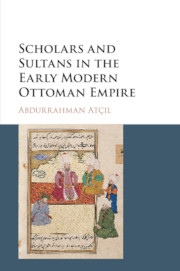Book contents
- Frontmatter
- Dedication
- Contents
- List of Tables
- Notes on Usage
- Acknowledgments
- Introduction
- Part I Scholars during the Early Ottoman Period (1300–1453)
- Part II The Formation of the Hierarchy (1453–1530)
- Part III The Consolidation of the Hierarchy (1530–1600)
- 6 The Focus of Attention Changes
- 7 The Ascendance of Dignitary Scholar-Bureaucrats (Mevali)
- 8 The Growth and Extension of the Hierarchy
- 9 The Rules and Patterns of Differentiation among Scholar-Bureaucrats
- 10 The Integration of Scholar-Bureaucrats in Multiple Career Tracks
- Conclusion
- Glossary
- Bibliography
- Index
9 - The Rules and Patterns of Differentiation among Scholar-Bureaucrats
from Part III - The Consolidation of the Hierarchy (1530–1600)
Published online by Cambridge University Press: 24 November 2016
- Frontmatter
- Dedication
- Contents
- List of Tables
- Notes on Usage
- Acknowledgments
- Introduction
- Part I Scholars during the Early Ottoman Period (1300–1453)
- Part II The Formation of the Hierarchy (1453–1530)
- Part III The Consolidation of the Hierarchy (1530–1600)
- 6 The Focus of Attention Changes
- 7 The Ascendance of Dignitary Scholar-Bureaucrats (Mevali)
- 8 The Growth and Extension of the Hierarchy
- 9 The Rules and Patterns of Differentiation among Scholar-Bureaucrats
- 10 The Integration of Scholar-Bureaucrats in Multiple Career Tracks
- Conclusion
- Glossary
- Bibliography
- Index
Summary
As the rules and practices related to the classification of scholarly positions developed, others emerged that determined the means of scholar-bureaucrats’ advancement and distinction. Some of these concerned the skills and competence of scholar-bureaucrats, such as academic excellence and the ability to discharge the duties of office. Others related to objective conditions, such as the geographic location of a scholar-bureaucrat's office and his economic resources. Still others regulated the influence of individuals’ personal and professional contacts on their success in the hierarchy. Generally speaking, these rules about distinction within the group of scholar-bureaucrats strengthened the tendency toward merit-based differentiation and augmented the control that the dignitary scholar-bureaucrats wielded in the hierarchical system.
Differentiation on the Basis of Scholarly Excellence
A scholar-bureaucrat's level of knowledge (or the perception thereof) could frequently influence his success in the hierarchy. This usually determined which track he would follow in his career. As detailed in Chapter 10, the track of dignitaries was considered higher, and those on it were expected to be more advanced in their academic studies, while the track of town judges was considered lower, and those on it usually cut their studies short.
One way to measure the level of scholar-bureaucrats’ knowledge was to give them examinations on theological and legal sciences. In cases where several scholar-bureaucrats who were all equally eligible applied for a single open position, an examination was administered. For example, in 1528/29, Çivizade Mehmed bin İlyas, Üskübi İshak Çelebi (d. 1536/37), and İsrafilzade (d. 1536/37) applied for an opening in the Sahn madrasas. They were asked to write short treatises on specified topics in jurisprudence and theology. They also examined one another's writings and wrote responses. Çivizade was declared the winner. A similar examination took place during Ebussuud's tenure as the chief judge of Rumeli (1537–45) when Vizeli Abdülkerim (d. 1553/54), Abdülkerimzade Mehmed (d. 1568), Kara Abdurrahman (d. 1569), and Kadızade Ahmed Şemseddin requested promotions at the same time.
In addition, if the chief judges were unsure about the competence of applicants for a position, they could test them. For example, Derviş Mehmed, who had received the status of novice (mülazemet), requested an appointment to the judgeship of Korubana. He brought a letter of recommendation from the judge of Ustrumca, confirming that he taught some students in the town.
- Type
- Chapter
- Information
- Scholars and Sultans in the Early Modern Ottoman Empire , pp. 170 - 187Publisher: Cambridge University PressPrint publication year: 2016



